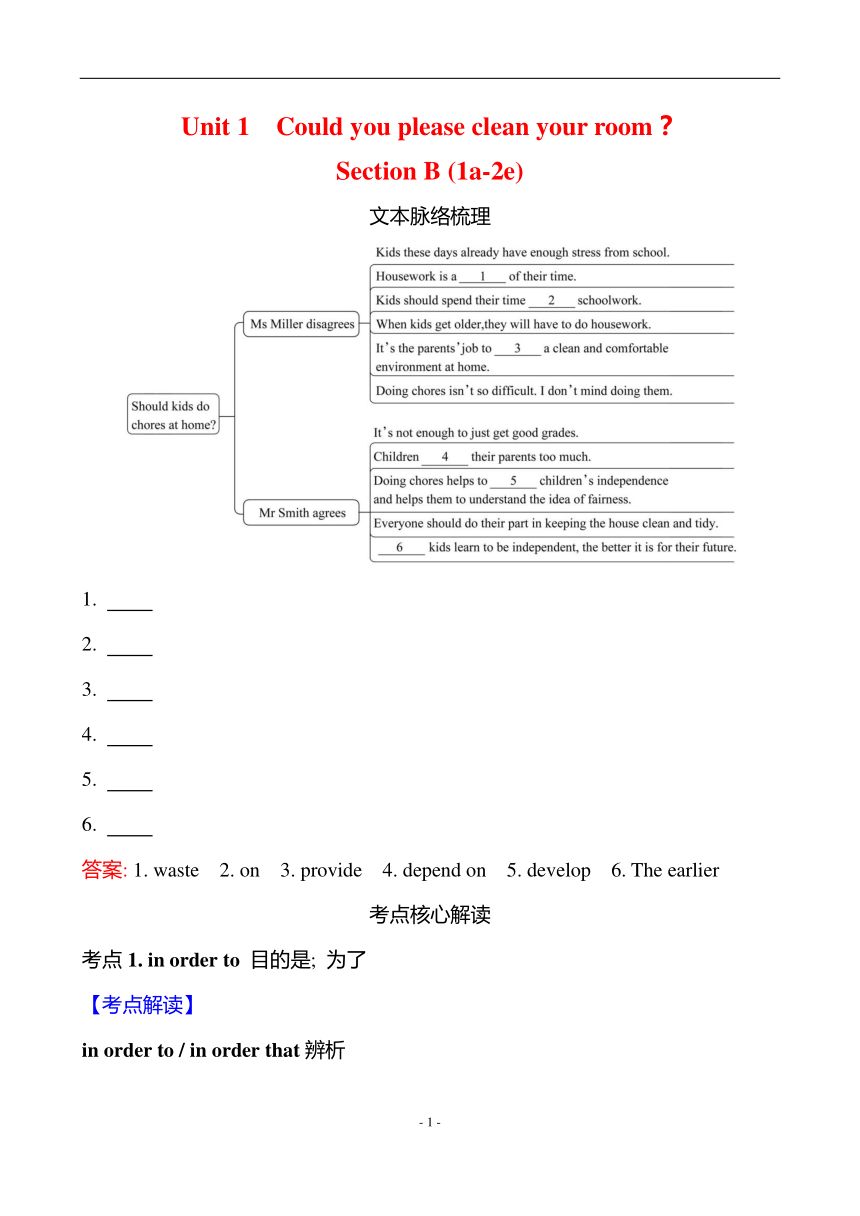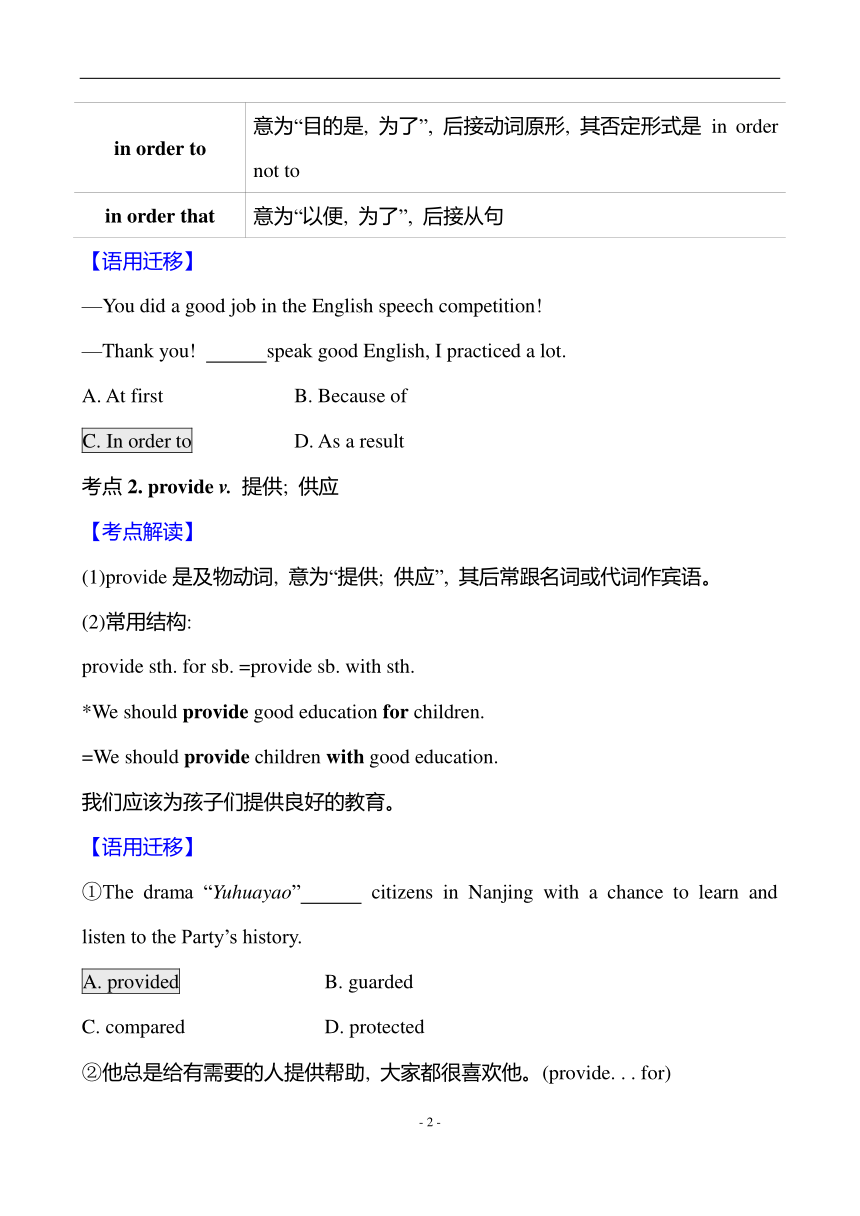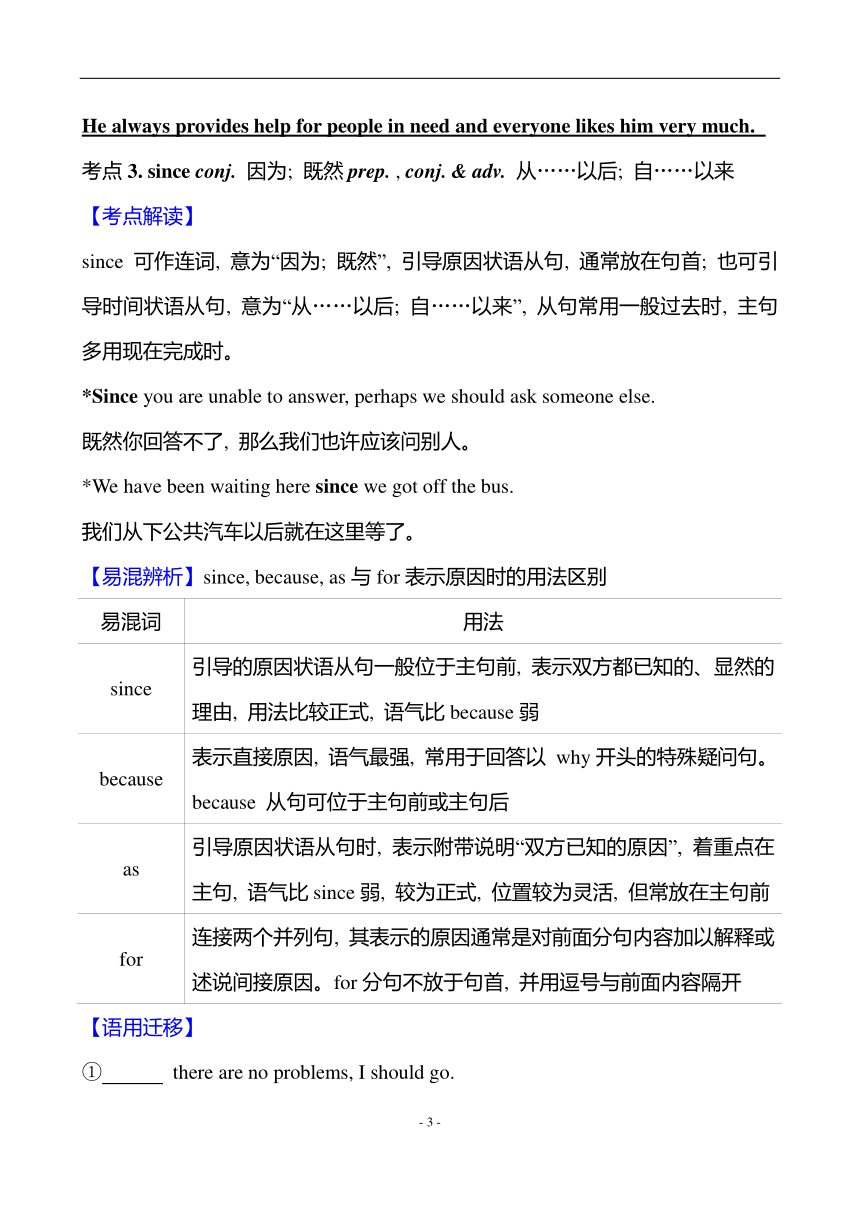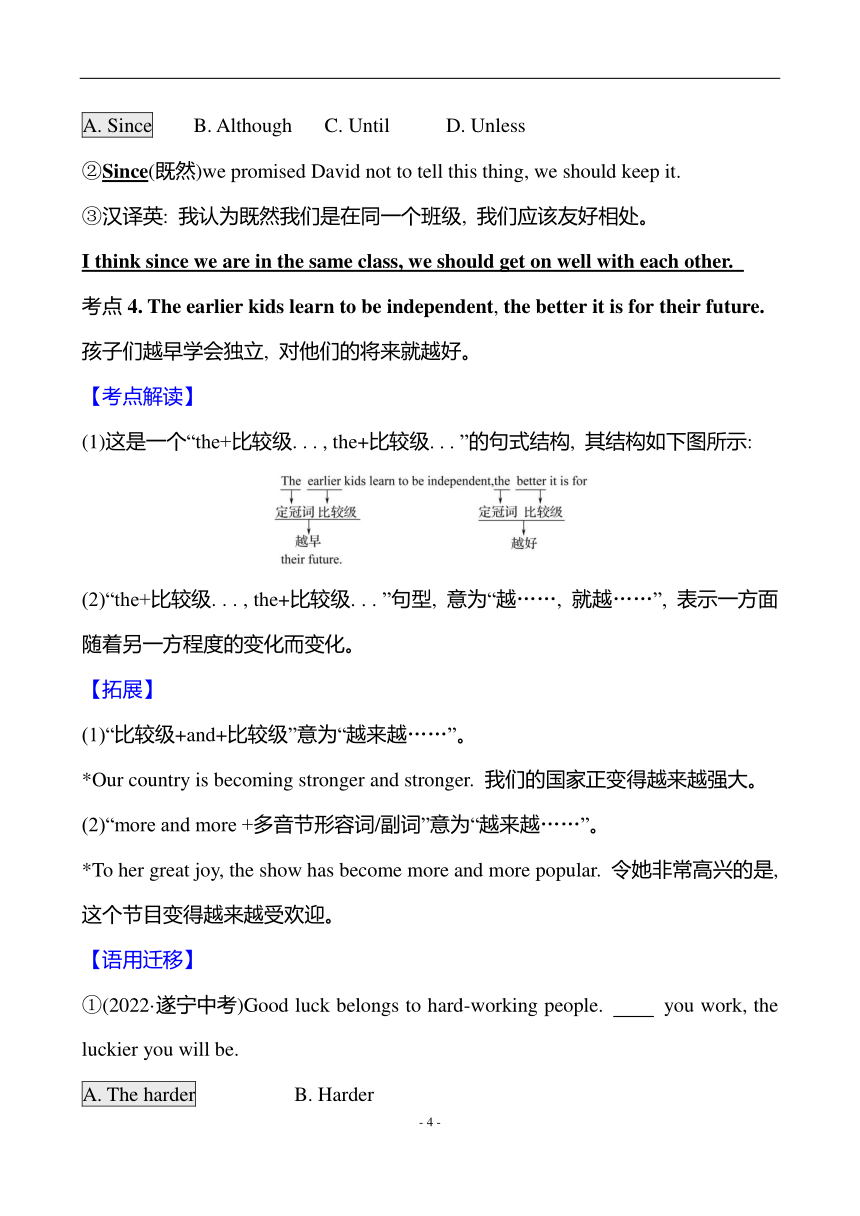Unit 1 Could you please clean your room?Section B (1a-2e)学案(无答案) 2024-2025学年英语鲁教版八年级上册
文档属性
| 名称 | Unit 1 Could you please clean your room?Section B (1a-2e)学案(无答案) 2024-2025学年英语鲁教版八年级上册 |

|
|
| 格式 | docx | ||
| 文件大小 | 242.1KB | ||
| 资源类型 | 教案 | ||
| 版本资源 | 鲁教版 | ||
| 科目 | 英语 | ||
| 更新时间 | 2024-06-13 11:40:32 | ||
图片预览




文档简介
Unit 1 Could you please clean your room?
Section B (1a-2e)
文本脉络梳理
1.
2.
3.
4.
5.
6.
答案: 1. waste 2. on 3. provide 4. depend on 5. develop 6. The earlier
考点核心解读
考点1. in order to 目的是; 为了
【考点解读】
in order to / in order that辨析
in order to 意为“目的是, 为了”, 后接动词原形, 其否定形式是 in order not to
in order that 意为“以便, 为了”, 后接从句
【语用迁移】
—You did a good job in the English speech competition!
—Thank you! speak good English, I practiced a lot.
A. At first B. Because of
C. In order to D. As a result
考点2. provide v. 提供; 供应
【考点解读】
(1)provide是及物动词, 意为“提供; 供应”, 其后常跟名词或代词作宾语。
(2)常用结构:
provide sth. for sb. =provide sb. with sth.
*We should provide good education for children.
=We should provide children with good education.
我们应该为孩子们提供良好的教育。
【语用迁移】
①The drama “Yuhuayao” citizens in Nanjing with a chance to learn and listen to the Party’s history.
A. provided B. guarded
C. compared D. protected
②他总是给有需要的人提供帮助, 大家都很喜欢他。(provide. . . for)
He always provides help for people in need and everyone likes him very much.
考点3. since conj. 因为; 既然prep. , conj. & adv. 从……以后; 自……以来
【考点解读】
since可作连词, 意为“因为; 既然”, 引导原因状语从句, 通常放在句首; 也可引导时间状语从句, 意为“从……以后; 自……以来”, 从句常用一般过去时, 主句多用现在完成时。
*Since you are unable to answer, perhaps we should ask someone else.
既然你回答不了, 那么我们也许应该问别人。
*We have been waiting here since we got off the bus.
我们从下公共汽车以后就在这里等了。
【易混辨析】since, because, as与for表示原因时的用法区别
易混词 用法
since 引导的原因状语从句一般位于主句前, 表示双方都已知的、显然的理由, 用法比较正式, 语气比because弱
because 表示直接原因, 语气最强, 常用于回答以 why开头的特殊疑问句。because 从句可位于主句前或主句后
as 引导原因状语从句时, 表示附带说明“双方已知的原因”, 着重点在主句, 语气比since弱, 较为正式, 位置较为灵活, 但常放在主句前
for 连接两个并列句, 其表示的原因通常是对前面分句内容加以解释或述说间接原因。for分句不放于句首, 并用逗号与前面内容隔开
【语用迁移】
① there are no problems, I should go.
A. Since B. Although C. Until D. Unless
②Since(既然)we promised David not to tell this thing, we should keep it.
③汉译英: 我认为既然我们是在同一个班级, 我们应该友好相处。
I think since we are in the same class, we should get on well with each other.
考点4. The earlier kids learn to be independent, the better it is for their future.
孩子们越早学会独立, 对他们的将来就越好。
【考点解读】
(1)这是一个“the+比较级. . . , the+比较级. . . ”的句式结构, 其结构如下图所示:
(2)“the+比较级. . . , the+比较级. . . ”句型, 意为“越……, 就越……”, 表示一方面随着另一方程度的变化而变化。
【拓展】
(1)“比较级+and+比较级”意为“越来越……”。
*Our country is becoming stronger and stronger. 我们的国家正变得越来越强大。
(2)“more and more +多音节形容词/副词”意为“越来越……”。
*To her great joy, the show has become more and more popular. 令她非常高兴的是, 这个节目变得越来越受欢迎。
【语用迁移】
①(2022·遂宁中考)Good luck belongs to hard-working people. you work, the luckier you will be.
A. The harder B. Harder
C. The hardest D. The hard
②越是困难时刻, 越要坚定信心。(difficult; great)
The more difficult things get, the greater the need grows to stay confident.
课时分层演练
【A层 基础练】
Ⅰ. 根据句意及首字母或汉语提示完成单词
1. We should be against the waste of food.
2. Our country has developed a lot in recent years.
3. The Greens are getting on well with their neighbours(邻居).
4. He has no stress(压力)because he has enough preparations.
5. He is ill(生病的), so he can’t go to school.
Ⅱ. 用所给词的适当形式填空
1. The girl dropped(drop) her books on the bus when she got off.
2. Using public chopsticks is(be)necessary when eating with others.
3. Mr Wang is trying his best to develop his son’s independence(independent).
4. Do you mind washing(wash) these clothes
5. I think many children don’t understand the idea of fairness(fair).
Ⅲ. 完成句子
1. 我们应该保持我们的教室干净整洁。
We should keep our classroom clean and tidy.
2. 没有必要跟她说那么多。
There’s no need to talk to her so much.
3. 他淋了雨, 结果病了。
He got wet in the rain. As a result, he fell ill.
4. 孩子应该学会独立。
Children should learn to be independent.
5. 每个学生都应尽自己的职责以求进步。
Every student should do his part in making progress.
Ⅳ. 阅读理解
When Justin Tong was a child, other kids felt sorry for him. His parents always had him doing lots of housework such as carrying out the rubbish and sending newspapers. But when he grew up, he was better off than his childhood friends and lived a happier and healthier life.
This is the finding of a 40-year study that followed the lives of 456 children in London. It showed that the children who had worked hard in childhood had a richer and happier future. “Children who worked in the home or community (社区) got ability and came to feel they were worthwhile members of society (社会), ” said Daniel Brown, the psychologist who made the discovery. “And because they felt good about themselves, others felt good about them. ”
Brown’s study followed these children. Interviews were repeated at ages 25, 31 and 47. Under Brown, the researchers compared the children’s mental-health scores with their childhood-activity scores. Points were for part-time jobs, housework, effort in school, and ability to deal with problems.
Working at any age is important. Childhood activities help a child develop independence and ability. They also help him understand that people must work together and work toward common goals. The most able adults are those who know how to do this.
Yet work isn’t everything. As Tolstoy once said, “One can live successfully in this world if one knows how to work and how to love, to work for the person one loves and to love one’s work. ”
1. Why did other kids feel sorry for Justin Tong when he was a child
A. Because his parents let him do lots of housework.
B. Because he couldn’t carry heavy things.
C. Because his parents had him doing much homework.
D. Because he was unhappy.
2. What do we know about Justin Tong
A. He enjoyed a happy life.
B. He felt sorry for the other kids.
C. He always sold newspapers.
D. He seldom collected rubbish.
3. Who will probably succeed in the future according to Paragraph 2
A. Children who enjoy happier and richer lives.
B. Children who work in the home or community.
C. Children who take part in Daniel Brown’s study.
D. Children who feel good about people around them.
4. How did Brown follow the children in his study
A. By giving housework and praise.
B. By interviewing and giving scores.
C. By setting goals and showing love.
D. By solving problems and testing them.
5. What’s the purpose of the passage
A. To talk about an interesting study.
B. To introduce Justin Tong’s success.
C. To tell us about childhood activities.
D. To encourage children to work hard.
Ⅴ. 任务型阅读
(A)Many parents think that it’s very difficult to get their children to do chores. But I don’t think so.
My daughter is ten years old. At night, I make her a chore list for the following days. Then I stick(贴)the paper with chores on her door. Usually she gets three to eight chores a day. It (B)d on how she does chores. If she does all of her chores well, she can get fewer chores next day. The chores are some easy ones, such as sweeping the floor, folding the clothes and cleaning the table after dinner.
For my other two children, the chores are different because they are very young. They both know how to put their empty dinner plates in the dishwasher. My 19-month-old son helps me put the dirty clothes in the washing machine when I am doing the (C) w . They can also help me when I’m working in the yard. They help me pick up the sticks(枝条) and throw them away.
根据短文内容, 按要求完成下列任务。
任务一: 将文中(A)处画线句子翻译成汉语。
1. 很多父母认为让他们的孩子做家务是非常困难的。
任务二: 根据首字母提示, 在文中(B)、(C)两处的横线上填写合适的单词。
2. depends
3. washing
任务三: 简要回答问题。
4. How does the writer’s ten-year-old daughter know her chores
By reading the paper with chores on her door.
5. How many children does the writer have
Three/3.
【词汇积累】
worthwhile / w θ wa l/ adj. 值得做的; 有价值的
psychologist /sa k l d st/ n. 心理学家
2
Section B (1a-2e)
文本脉络梳理
1.
2.
3.
4.
5.
6.
答案: 1. waste 2. on 3. provide 4. depend on 5. develop 6. The earlier
考点核心解读
考点1. in order to 目的是; 为了
【考点解读】
in order to / in order that辨析
in order to 意为“目的是, 为了”, 后接动词原形, 其否定形式是 in order not to
in order that 意为“以便, 为了”, 后接从句
【语用迁移】
—You did a good job in the English speech competition!
—Thank you! speak good English, I practiced a lot.
A. At first B. Because of
C. In order to D. As a result
考点2. provide v. 提供; 供应
【考点解读】
(1)provide是及物动词, 意为“提供; 供应”, 其后常跟名词或代词作宾语。
(2)常用结构:
provide sth. for sb. =provide sb. with sth.
*We should provide good education for children.
=We should provide children with good education.
我们应该为孩子们提供良好的教育。
【语用迁移】
①The drama “Yuhuayao” citizens in Nanjing with a chance to learn and listen to the Party’s history.
A. provided B. guarded
C. compared D. protected
②他总是给有需要的人提供帮助, 大家都很喜欢他。(provide. . . for)
He always provides help for people in need and everyone likes him very much.
考点3. since conj. 因为; 既然prep. , conj. & adv. 从……以后; 自……以来
【考点解读】
since可作连词, 意为“因为; 既然”, 引导原因状语从句, 通常放在句首; 也可引导时间状语从句, 意为“从……以后; 自……以来”, 从句常用一般过去时, 主句多用现在完成时。
*Since you are unable to answer, perhaps we should ask someone else.
既然你回答不了, 那么我们也许应该问别人。
*We have been waiting here since we got off the bus.
我们从下公共汽车以后就在这里等了。
【易混辨析】since, because, as与for表示原因时的用法区别
易混词 用法
since 引导的原因状语从句一般位于主句前, 表示双方都已知的、显然的理由, 用法比较正式, 语气比because弱
because 表示直接原因, 语气最强, 常用于回答以 why开头的特殊疑问句。because 从句可位于主句前或主句后
as 引导原因状语从句时, 表示附带说明“双方已知的原因”, 着重点在主句, 语气比since弱, 较为正式, 位置较为灵活, 但常放在主句前
for 连接两个并列句, 其表示的原因通常是对前面分句内容加以解释或述说间接原因。for分句不放于句首, 并用逗号与前面内容隔开
【语用迁移】
① there are no problems, I should go.
A. Since B. Although C. Until D. Unless
②Since(既然)we promised David not to tell this thing, we should keep it.
③汉译英: 我认为既然我们是在同一个班级, 我们应该友好相处。
I think since we are in the same class, we should get on well with each other.
考点4. The earlier kids learn to be independent, the better it is for their future.
孩子们越早学会独立, 对他们的将来就越好。
【考点解读】
(1)这是一个“the+比较级. . . , the+比较级. . . ”的句式结构, 其结构如下图所示:
(2)“the+比较级. . . , the+比较级. . . ”句型, 意为“越……, 就越……”, 表示一方面随着另一方程度的变化而变化。
【拓展】
(1)“比较级+and+比较级”意为“越来越……”。
*Our country is becoming stronger and stronger. 我们的国家正变得越来越强大。
(2)“more and more +多音节形容词/副词”意为“越来越……”。
*To her great joy, the show has become more and more popular. 令她非常高兴的是, 这个节目变得越来越受欢迎。
【语用迁移】
①(2022·遂宁中考)Good luck belongs to hard-working people. you work, the luckier you will be.
A. The harder B. Harder
C. The hardest D. The hard
②越是困难时刻, 越要坚定信心。(difficult; great)
The more difficult things get, the greater the need grows to stay confident.
课时分层演练
【A层 基础练】
Ⅰ. 根据句意及首字母或汉语提示完成单词
1. We should be against the waste of food.
2. Our country has developed a lot in recent years.
3. The Greens are getting on well with their neighbours(邻居).
4. He has no stress(压力)because he has enough preparations.
5. He is ill(生病的), so he can’t go to school.
Ⅱ. 用所给词的适当形式填空
1. The girl dropped(drop) her books on the bus when she got off.
2. Using public chopsticks is(be)necessary when eating with others.
3. Mr Wang is trying his best to develop his son’s independence(independent).
4. Do you mind washing(wash) these clothes
5. I think many children don’t understand the idea of fairness(fair).
Ⅲ. 完成句子
1. 我们应该保持我们的教室干净整洁。
We should keep our classroom clean and tidy.
2. 没有必要跟她说那么多。
There’s no need to talk to her so much.
3. 他淋了雨, 结果病了。
He got wet in the rain. As a result, he fell ill.
4. 孩子应该学会独立。
Children should learn to be independent.
5. 每个学生都应尽自己的职责以求进步。
Every student should do his part in making progress.
Ⅳ. 阅读理解
When Justin Tong was a child, other kids felt sorry for him. His parents always had him doing lots of housework such as carrying out the rubbish and sending newspapers. But when he grew up, he was better off than his childhood friends and lived a happier and healthier life.
This is the finding of a 40-year study that followed the lives of 456 children in London. It showed that the children who had worked hard in childhood had a richer and happier future. “Children who worked in the home or community (社区) got ability and came to feel they were worthwhile members of society (社会), ” said Daniel Brown, the psychologist who made the discovery. “And because they felt good about themselves, others felt good about them. ”
Brown’s study followed these children. Interviews were repeated at ages 25, 31 and 47. Under Brown, the researchers compared the children’s mental-health scores with their childhood-activity scores. Points were for part-time jobs, housework, effort in school, and ability to deal with problems.
Working at any age is important. Childhood activities help a child develop independence and ability. They also help him understand that people must work together and work toward common goals. The most able adults are those who know how to do this.
Yet work isn’t everything. As Tolstoy once said, “One can live successfully in this world if one knows how to work and how to love, to work for the person one loves and to love one’s work. ”
1. Why did other kids feel sorry for Justin Tong when he was a child
A. Because his parents let him do lots of housework.
B. Because he couldn’t carry heavy things.
C. Because his parents had him doing much homework.
D. Because he was unhappy.
2. What do we know about Justin Tong
A. He enjoyed a happy life.
B. He felt sorry for the other kids.
C. He always sold newspapers.
D. He seldom collected rubbish.
3. Who will probably succeed in the future according to Paragraph 2
A. Children who enjoy happier and richer lives.
B. Children who work in the home or community.
C. Children who take part in Daniel Brown’s study.
D. Children who feel good about people around them.
4. How did Brown follow the children in his study
A. By giving housework and praise.
B. By interviewing and giving scores.
C. By setting goals and showing love.
D. By solving problems and testing them.
5. What’s the purpose of the passage
A. To talk about an interesting study.
B. To introduce Justin Tong’s success.
C. To tell us about childhood activities.
D. To encourage children to work hard.
Ⅴ. 任务型阅读
(A)Many parents think that it’s very difficult to get their children to do chores. But I don’t think so.
My daughter is ten years old. At night, I make her a chore list for the following days. Then I stick(贴)the paper with chores on her door. Usually she gets three to eight chores a day. It (B)d on how she does chores. If she does all of her chores well, she can get fewer chores next day. The chores are some easy ones, such as sweeping the floor, folding the clothes and cleaning the table after dinner.
For my other two children, the chores are different because they are very young. They both know how to put their empty dinner plates in the dishwasher. My 19-month-old son helps me put the dirty clothes in the washing machine when I am doing the (C) w . They can also help me when I’m working in the yard. They help me pick up the sticks(枝条) and throw them away.
根据短文内容, 按要求完成下列任务。
任务一: 将文中(A)处画线句子翻译成汉语。
1. 很多父母认为让他们的孩子做家务是非常困难的。
任务二: 根据首字母提示, 在文中(B)、(C)两处的横线上填写合适的单词。
2. depends
3. washing
任务三: 简要回答问题。
4. How does the writer’s ten-year-old daughter know her chores
By reading the paper with chores on her door.
5. How many children does the writer have
Three/3.
【词汇积累】
worthwhile / w θ wa l/ adj. 值得做的; 有价值的
psychologist /sa k l d st/ n. 心理学家
2
同课章节目录
- Unit 1 Could you please clean your room?
- Section A
- Section B
- Unit 2 Why don't you talk to your parents?
- Section A
- Section B
- Unit 3 What were you doing when the rainstorm came
- Section A
- Section B
- Unit 4 An old man tried to move the mountains.
- Section A
- Section B
- Unit 5 What's the highest mountain in the world?
- Section A
- Section B
- Unit 6 Have you read Treasure Island yet?
- Section A
- Section B
- Unit 7 Have you ever been to a museum?
- Section A
- Section B
- Unit 8 I've had this bike for three years.
- Section A
- Section B
